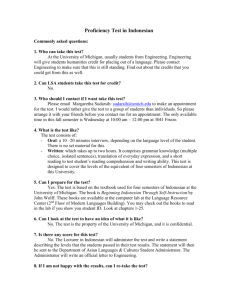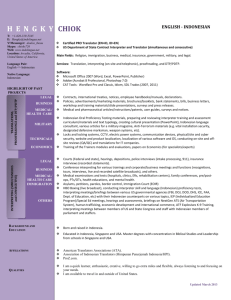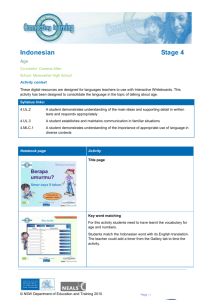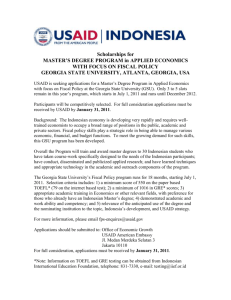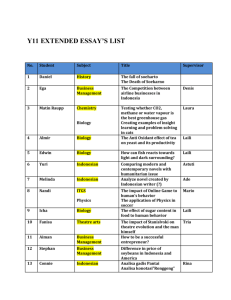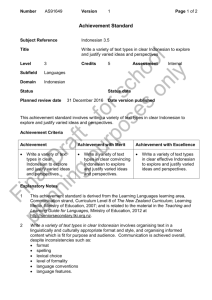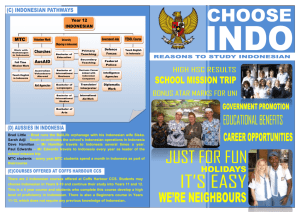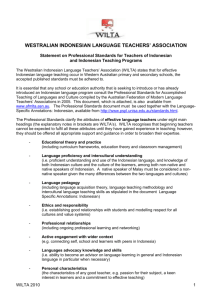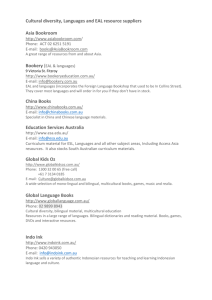unit: 10-4 immigration
advertisement
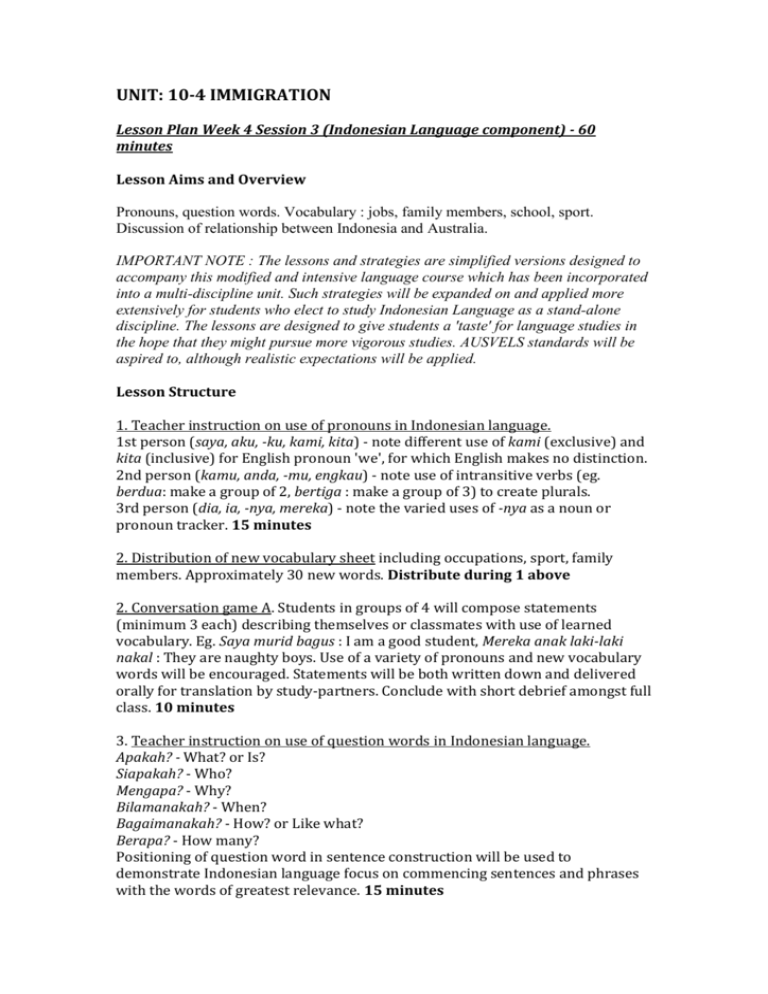
UNIT: 10-4 IMMIGRATION
Lesson Plan Week 4 Session 3 (Indonesian Language component) - 60
minutes
Lesson Aims and Overview
Pronouns, question words. Vocabulary : jobs, family members, school, sport.
Discussion of relationship between Indonesia and Australia.
IMPORTANT NOTE : The lessons and strategies are simplified versions designed to
accompany this modified and intensive language course which has been incorporated
into a multi-discipline unit. Such strategies will be expanded on and applied more
extensively for students who elect to study Indonesian Language as a stand-alone
discipline. The lessons are designed to give students a 'taste' for language studies in
the hope that they might pursue more vigorous studies. AUSVELS standards will be
aspired to, although realistic expectations will be applied.
Lesson Structure
1. Teacher instruction on use of pronouns in Indonesian language.
1st person (saya, aku, -ku, kami, kita) - note different use of kami (exclusive) and
kita (inclusive) for English pronoun 'we', for which English makes no distinction.
2nd person (kamu, anda, -mu, engkau) - note use of intransitive verbs (eg.
berdua: make a group of 2, bertiga : make a group of 3) to create plurals.
3rd person (dia, ia, -nya, mereka) - note the varied uses of -nya as a noun or
pronoun tracker. 15 minutes
2. Distribution of new vocabulary sheet including occupations, sport, family
members. Approximately 30 new words. Distribute during 1 above
2. Conversation game A. Students in groups of 4 will compose statements
(minimum 3 each) describing themselves or classmates with use of learned
vocabulary. Eg. Saya murid bagus : I am a good student, Mereka anak laki-laki
nakal : They are naughty boys. Use of a variety of pronouns and new vocabulary
words will be encouraged. Statements will be both written down and delivered
orally for translation by study-partners. Conclude with short debrief amongst full
class. 10 minutes
3. Teacher instruction on use of question words in Indonesian language.
Apakah? - What? or Is?
Siapakah? - Who?
Mengapa? - Why?
Bilamanakah? - When?
Bagaimanakah? - How? or Like what?
Berapa? - How many?
Positioning of question word in sentence construction will be used to
demonstrate Indonesian language focus on commencing sentences and phrases
with the words of greatest relevance. 15 minutes
3. Conversation game B. Variation on A above. Students, working in small groups,
will ask questions of each other which then require answer using a pronoun. Eg.
Siapa nama Ibumu? Nama Ibu saya Georgia : What is your mother's name? My
mother's name is Georgia. Apakah mereka tinggal di rumah besar? Tidak, mereka
tidak tinggal di rumah besar. Do they live in a big house? No they do not live in a
big house. Every student must ask and answer minimum 3 questions each.
Conclude with short debrief amongst full class. 10 minutes
4. Discussion of relationship between Indonesia and Australia.
Ask students their own impressions. Raise tourism as a topic. Briefly discuss
political issues including capital punishment, cattle exports and refugee
management. Attempt to diffuse or moderate any inflammatory comments.
Invite students to compare culture and lifestyle between countries based on
prior knowledge or information gained from unit study. 10 minutes
Explicit Use of e5 Pedagogy (Levels 1-4)
Engagement with the learning environment is crucial. I will wear an Indonesian
batik shirt, CD of gamelan music will be played very lightly in the background
and dried Indonesian spices will be used to create a fragrance in the classroom the intention to provide a multi-sensory environment for students.
Exploring the culture of Indonesia with all of its history and customs will assist
with the development and retention of language skills. Lesson activity 4
(Discussion of relationship between Indonesia and Australia) is particularly
designed to assist in this wider appreciation of international culture.
Explaining fundamental principles of Indonesian spelling, pronunciation and
grammar will be concomitant with all of the vocabulary tasks participated in by
the students as part of this lesson. It is recognised that the rote learning of
vocabulary, although essential, is of minimal value without the parallel learning
of these linguistic concepts - vocabulary is the 'bricks' and the linguistics is the
'mortar'. Word order will be given reinforcement : for instance in Indonesian
language any adjectives are placed after the noun, not before as in English.
Elaborating on concepts learned and indicating how they will be applied in
future classes will be of great importance. For instance, once question words
have been learned, their distinctive usage in Indonesian grammar will be
explored. For instance the word Bagaimanakah (How?) can also be used to
express 'What is it like?', therefore Bagaimanakah sekolah itu? : What is that
school like? (Is it big, is it well resourced, are the students happy etc?).
Evaluating progress will occur with group discussion at the end of each
conversation game and at the end of the session. Students will be prompted to
share what elements of the class they have felt competent with or have struggled
with. Language learning is a particularly treacherous learning process, as well as
a genuinely scaffold-based one, and continual evaluation and reinforcement
cannot be undervalued.
Intercultural Understanding Focus
A seminal aim of the unit Immigration is to stimulate and enhance cross-cultural
appreciation. The study of language, history and customs of a neighboring
foreign country with significant cultural variance is considered an excellent
means of achieving this focus. All of the lesson plan activities are intended to
contribute, with Part 4 (Discussion of relationship between Indonesia and
Australia) especially designed to address this in an explicit fashion. It is hoped
that study of the unit may improve cross-cultural empathy and reduce any
entrenched prejudices which may exist.
Learning Activities that Include the Use of ICT Applications
I will continue with the use of the iPad application Indonesian Language for Kids
http://download.cnet.com/Indonesian-English-Language-for-Kids/300020415_4-75929753.html
This is a free software which serves as a preliminary vocabulary builder. Using
pictorial, linguistic and aural recognition this is an excellent tool which engages
multiple intelligences to engage students in the learning process. As a personal
teaching philosophy I do not intend to succumb to an over-reliance on screenbased devices, but my research has identified this as a productive supplementary
teaching tool.
New topics of vocabulary will be identified for use in today's class, particularly
occupations, hobbies, sports and family members.
Learning Activities that Involve the Use of Higher Order Thinking
Language study necessarily involves rote-learning ('Remembering') of
vocabulary, although even this is greatly enhanced by invoking the higher
thinking levels of Bloom's Taxonomy. Basic sentence construction and word
order will be explored to fulfil the middle tiers ('Understanding' and 'Applying')
and serve as a pathway to the upper tiers ('Analysing', 'Evaluating') by
translation of conversational Indonesian. Finally the highest level of the
taxonomy ('Creating') is pursued, which is best done in language study by
composition of original writing.
Learning Activities that are Rich and Varied
The learning environment will be carefully prepared to create multi-sensory
stimuli (teacher's attire, gamelan music, Indonesian spices). The conversation
games are intended to stimulate attempts at all of the following: a) Grammar and
sentence construction; b) Pronunciation and diction; c) Written execution of
Indonesian language. The interchanging role of 'inquisitor' and 'responder' is
hoped to give students a stronger immersion in concepts of conversational
Indonesian. Vocabulary sheets, classroom word-charts, teacher recitation and
ICT application will provide multiple stimuli for necessary vocabulary-building.
Formative Assessment of Student Learning
Formative assessment shall be conducted by myself moving between the 4
activity groups, observing the performance of students and providing on-thespot feedback as well as answer sheets for the written exercise. An enjoyment of
the speaking and decoding of a foreign language is considered paramount in this
early stage, and more important than strict results-oriented assessment.
Resources
Cartwright K. & Soehodo S. 2000, Bagus Sekali Book 1,Heinemann Victoria
Indonesian Language for Kids, ICT application by Burnedapps.
